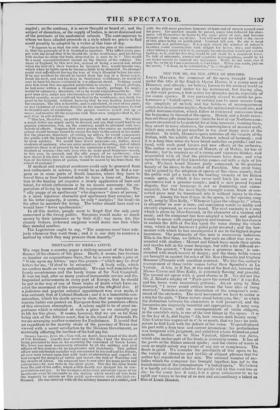NOT FOR ME, OR TIIE APPLE OF DISCORD.
Louis Mamma, the composer of the opera brought forward under this title at the English Opera House, is a young man of Hanover, and already, we believe, known to the musical world as a violin player and writer for his instrument, but having also, as this work proves, a fine genius tOr dramatic music, especially of the comic species. It was particularly absurd to entitle his per- fbrmance a " ballad opera," tor nothing can be more remote from the simplicity of melody mid the baldness of accompaniment which that designation implies, than the spirited and elegant airs, and artful instrumentation, which follow in continued succession from the beginning to the end of this opera. Melody and a fertile inven- tion are those gifts from heaven v. hicls the best of our Northern com- posers are content to be grateful for at long intervals : wanting these,, they resort to noisy choruses, the commonplaces of musical craft, which may easily be put together in the most foggy state of the intellect. In truth, Maurer's opera contains all the vivacity of the Italian, with the solidity of the German school of harmony ; and it is a .long time since we have heard melodies so polished and na- tural, wills such good basses and new effects of the orchestra. The author is not an imitator of Mozart, or of Weber, far less of Rossini ; but he reminds us of a young and vigorous thinker, well acquainted with all that his predecessors have done, and who upon the strength of that knowledge comes out with a style of his own. We have heard Maurer justly compared, in the peculiar beauty of his ideas, to the author of Fanchon. One great thing will be gained by the adoption of operas of this class, namely, that the public will get a taste for the bustling vivacity of the Italian comic opera, of which it has never until lately (in one or two Specimens) had a genuine sample; and it is now proved beyond dispute, that our language is not so lumbering and unma- nageable, but that the most highly-wrought comic finale or con- certed piece may be transfused into it without injury to its cha- racter. Among the best things in the opera, is the opening song in G, sung by Miss Kelly, " hene'er I pass the village by ;" which is altogether as new a tune, and containing words as archly and cleverly expressed, as we ever heard. The next curiosity is a song which is given by Miss Goward, in the character of a virulent old maid ; and the composer has here adapted a tedious and spiteful homily to music with equal propriety and humour. He has chosen to sustain the fifth of the key upon the voice during the whole song, which in fact becomes a pedal point inverted ; and the har- monies with which he has accompanied it are in the highest degree ingenious. The pertinacity of this note is excessively ludicrous. This is the first time, we believe, that such an effect was ever as- sociated with drollery : Mozart and Gluck have made their spirits and oracles talk in the same language, but with a far different re- sult. The ouintett, "Your uncle was a generous man," is con- structed with much beauty of design ; and the three treble voices are brought in against the solos of Mr. Roe (Russell) and Captain
Bouncer (Penson) with excellent contrast. We like this author's management of three treble voices better than Spontini's in La Vestale. A trio, in B flat, at the end of the first act, between the Misses Cawse and Miss Kelly, is extremely flowing and graceful. The second act opens with a good chorus in D. We did not like Mr. J. Bland's singing of "Pat-is gave the envied lot :" it was flat,
and his tones were excessively guttural. An air sung by Miss Goward, "I never could endure before the bare idea of being
married," furnishes another illustration of the composer's com-
mand of the orchestra. The next movement we have to notice is a trio for the girls, "Three sisters stand before you, Sir ;" in which
the distinction between the characters is well preserved, and the harmonies are singularly beautiful and appropriate. A song sung by Miss Cawse, with an accompaniment of violin obligato,
in the cantabile style, is one of the best things in the opera. It is in the key of A, and begins " Ah, how unsure cloth beauty seem." Miss Cawse has improved in st.yle so much, that we have no incli- nation to find fault with the defects of her voice. Wagstaff played his part with a firm tone and correct intonation : his performance was tempered with judgment, and exhibited a taste formed on good models. Another air by Miss Virulent, (Goward) con furia, which also makes part of the finale, is admirably comic. It has all the gusto of the Italian animal spirits ; and the clatter of words is such as might satisfy any virago of any age or complexion. The
finale is good. We consider the peculiarity of this opera to be, the variety of character and fertility of elegant phrases that the author has manifested in his airs. The unusual number of me- lodies which the composer has brought together, has led to the foolish mistake of the denomination "a ballad opera." We believe it is hardly yet decided whether the public will let this work live or
die : be the event how it may, it is a great satisfaction to us to uplift our voices in favour of so new and extraordinary a talent as that of Louis Maurer.


















 Previous page
Previous page